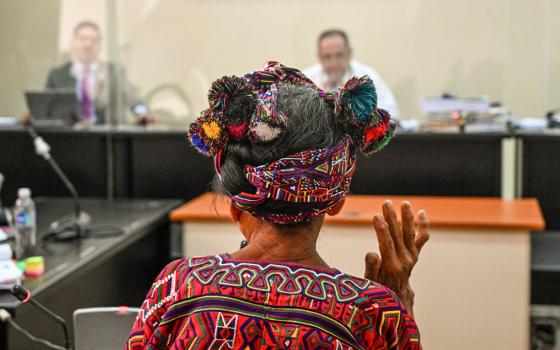
(Unsplash/Ravi Roshan)
Most people I know would cringe at being called "holy." The very word secretes poisons like "uninteresting," "sexless," "goody-goody," "pretentious." Hardly a path to popularity. Popes canonize a married couple only after 13 children and vows of celibacy. Who wants to walk around with a halo following them?
Our ideas of holiness are so stringent that even aspiring to it seems presumptuous. Jesus faced that. "What's this wisdom that has been given him? Isn't he the carpenter?" (Matthew 13:54-55) Even contact with the unsacred sullies any suggestion of sanctity. "This man welcomes sinners and eats with them!" (Luke 15:2)
But there is the key: Jesus loved imperfect people. On that score, all of us qualify!
To be holy, we need not be flawless, destitute or virginal. Just as you need not be a World Series MVP to be judged a legitimate ballplayer, you don't need to be Daniel in a den of lions to be a hero, or a saint.
St. Irenaeus said, "The glory of God is humanity, fully alive." Supernatural life is not supranatural, not beyond the limits of human nature, but rather humanity itself superbly fulfilled. What distinguishes humans is the potential to learn and to choose love, or not.
Other animals know facts; a stag pursued knows that danger is behind him, but as far as we know he doesn't ask why. We have at least the capacity to understand. Other animals can give their lives for their young. But we can give our lives (often without dying) for people we don't even like.
Can we entertain the possibility our God-given purpose is to prepare a fully realized recipient for the gift of holiness? Nor is that role limited to purging defects, as so many of us were taught, but more importantly to amplify those potentials of knowing and loving. "Let your light shine before men in such a way they may see your good works, and glorify your Father in heaven" (Matthew 5:16).
If God is convinced an individual is trying his or her best (for the moment) to follow Jesus' commandment to love and to embrace her neighbor as herself, that individual qualifies as a saint, even if the Vatican hasn't gotten around to ratifying God's judgment. That individual doesn't even need the external, ritual bestowal of baptism or any other symbolic sign of acceptance (cf. Simone Weil, Albert Camus, Kurt Vonnegut). No intelligent being would accept a God less kind than oneself.
Advertisement
We all know "unchurched" people who are "the salt of the earth," as Jesus hoped his disciples would be (Matthew 5:13). We can call them when we're stalled on the freeway at 2 a.m. They will tell us when we are too pushy or flirtatious or tipsy, and not hesitate because we might stop liking them. Difficult to imagine them excluded from a kingdom that welcomes Magdalene and the good thief.
If God so generously offers the merits of Christ to make up for our inadequacies and indiscriminately invites us to holiness, he does not expect anything near undiluted purity of motive or action when he asks us to lead holy lives.
This is borne out, page after page, in Scripture — despite our penchant for sanitizing our saints regardless of what they did. Abraham, our "father in faith," pandered his wife into another man's harem. Jacob scammed his brother's birthright. Even unassailable Moses stammered for some time trying to weasel out from God's call. David, ancestor of the Messiah, was a conniving adulterer and murderer. Unthinking piety turns the apostles into bowdlerized saints instead of a passel of Keystone Cops, often bumping into one another in pursuit of personal advancement.
Reflect on down-to-earth holy people you know. They are not the fastidiously devout, the cautious observers of the tiniest rules, the judgmental. They are the nun who held your forehead when you threw up, the patient teacher who taught you to write, the parents who forgave before we "deserved" it, and the friend who listened and still loved you when you told her your darkest secrets.

(CNS photo/Nancy Wiechec)
There is an almost palpable serenity about them. They seem unafraid and open, indiscriminately caring, inwardly coherent and focused. Their holiness is their wholeness, their altogetherness.
Holiness is not a static achievement but a continuing evolution of soul that becomes contagious. St. Paul suggests ordinary holiness should be easily evident. "The fruit of the Spirit is love, joy, peace, patience, kindness, goodness, faithfulness, gentleness and self-control" (Galatians 5:22-23).
Holy is really a synonym for expressing these qualities of God. Each of those words describes what God intended fully evolved human beings to be. We are the only species whose nature is not a blueprint but an invitation.
Every rock, root and rabbit fulfills God's intentions without insubordination. Only we, of all creatures, can choose not to live up to the inner programming, which invites us by a quantum leap above even the most intelligent animals. As far as we know, no shark or tiger is annoyed by qualms of conscience. They are incapable of being wrong.
Those who are interested more than anything in understanding more and loving more seem more alive, more fulfilled as specifically human than those who succumb to the allurements of the beast in us (pride, covetousness, lust, etc.). Consider Sir Thomas More. Consider Bruce Springsteen.
Also, unlike other species, the requirements embedded in our nature are not immediately operative through inbred instincts. Each of us must discover the directions in which we will find our holiness. This is the goal of a lifelong education, not merely to make a living but to find out what living is for.
"Holy" is not something we achieve. Wanting to be it is what it's all about.
[Jesuit Fr. William J. O'Malley is the author of more than 40 books. He is loved and remembered by the thousands of young people he taught for more than 60 years. O'Malley is now retired and living at the Jesuit home for old superheroes at Fordham University.]






